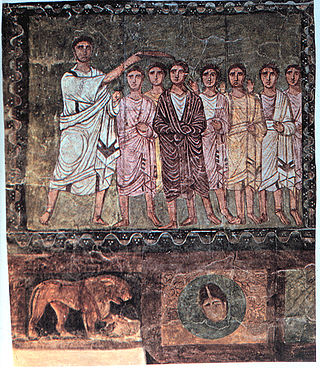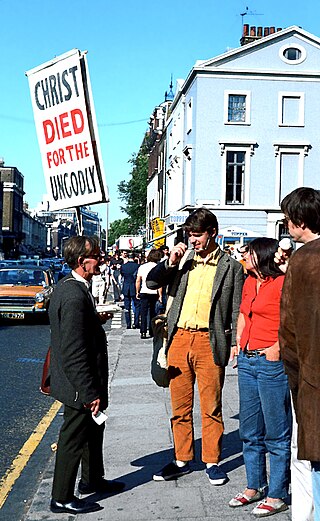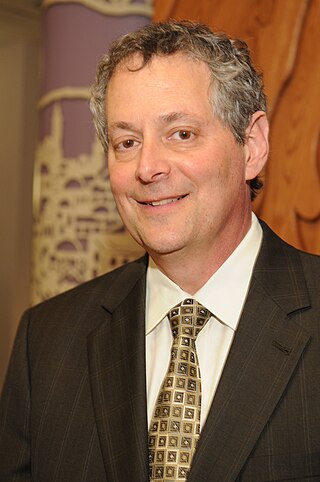
In Abrahamic religions, a messiah or messias is a saviour or liberator of a group of people. The concepts of mashiach, messianism, and of a Messianic Age originated in Judaism, and in the Hebrew Bible, in which a mashiach is a king or High Priest traditionally anointed with holy anointing oil.

Nostra aetate, or the Declaration on the Relation of the Church with Non-Christian Religions, is an official declaration of the Vatican II, an ecumenical council of the Catholic Church. It was promulgated on 28 October 1965 by Pope Paul VI. Its name comes from its incipit, the first few words of its opening sentence, as is tradition. It passed the Council by a vote of 2,221 to 88 of the assembled bishops.
Religious pluralism is a set of religious world views that hold that one's religion is not the sole and exclusive source of truth, and thus recognizes that some level of truth and value exists in other religions. As such, religious pluralism goes beyond religious tolerance, which is the condition of peaceful existence between adherents of different religions or religious denominations.

Religious ties between Muslims and the Jewish people have existed since the founding of Islam in the Arabian Peninsula in the 7th century; Muhammad's views on Jews were shaped by his extensive contact with the Jewish tribes of Arabia during his lifetime. Islam shares similar values, guidelines, and principles with the Jewish religion, and also incorporates Jewish history as a part of its own. Muslims regard the Israelites, to whom Jews and Samaritans trace their ethnic ancestry, as an important religious concept; they are referenced around 43 times in the Quran, excluding individual prophets, and in many accounts of hadith. Similarly, Moses, the most important Jewish prophet, is also regarded by Muslims as an Islamic prophet and messenger ; his name is mentioned in the Quran 136 times—more than any other individual—and his life is narrated and recounted more than that of any other prophet. The Torah, which is the compilation of the first five books of the Hebrew Bible, is also held by Muslims as an Islamic holy book that was revealed by God through various Israelite prophets and messengers. Later rabbinic authorities and Jewish scholars, such as Maimonides, engaged in discussions concerning the relationship between Islam and Jewish religious law. Maimonides himself, it has been argued, was influenced by Islamic legal thought while living in the caliphates of his time.

Proselytism is the policy of attempting to convert people's religious or political beliefs. Carrying out attempts to instill beliefs can be called proselytization.

Warith Deen Mohammed, also known as W. Deen Mohammed, Imam W. Deen Muhammad and Imam Warith Deen, was an African-American Muslim leader, theologian, philosopher, Muslim revivalist, and Islamic thinker.

Interfaith dialogue, also known as interreligious dialogue, refers to cooperative, constructive, and positive interaction between people of different religious traditions and/or spiritual or humanistic beliefs, at both the individual and institutional levels.
The Catholic Church and Judaism have a long and complex history of cooperation and conflict, and have had a strained relationship throughout history, with periods of persecution, violence and discrimination directed towards Jews by Christians, particularly during the Middle Ages.

The Muslim World League is an international Islamic non-governmental organization based in Mecca, Saudi Arabia that promotes what it calls the true message of Islam by advancing moderate values.
Religion in Israel is manifested primarily in Judaism, the ethnic religion of the Jewish people. The State of Israel declares itself as a "Jewish and democratic state" and is the only country in the world with a Jewish-majority population. Other faiths in the country include Islam, Christianity and the religion of the Druze people. Religion plays a central role in national and civil life, and almost all Israeli citizens are automatically registered as members of the state's 14 official religious communities, which exercise control over several matters of personal status, especially marriage. These recognized communities are Orthodox Judaism, Islam, the Druze faith, the Catholic Church, Greek Orthodox Church, Syriac Orthodox Church, Armenian Apostolic Church, Anglicanism, and the Baháʼí Faith.

David Shlomo Rosen KSG CBE is an English-Israeli rabbi and interfaith peacemaker. He was Chief Rabbi of Ireland (1979–1985) before relocating permanently to Israel in 1985. He has taken leave from his position as AJC’s International Director of Interreligious Affairs in order to serve as Special Advisor to the Abrahamic Family House in Abu Dhabi. From 2005 until 2009 he headed the International Jewish Committee for Inter-religious Consultations (IJCIC), the broad-based coalition of Jewish organizations and denominations that represents World Jewry in its relations with other world religions.
The Pittsburgh Platform is a pivotal 1885 document in the history of the American Reform Movement in Judaism that called for Jews to adopt a modern approach to the practice of their faith. While it was never formally adopted by the Union of American Hebrew Congregations (UAHC) or the Central Conference of American Rabbis founded four years after its release, and several rabbis who remained associated with Reform in its wake attempted to distance themselves from it, the platform exerted great influence over the movement in the next fifty years, and still influences some Reform Jews who hold classicist views to this day.

The Regensburg lecture or Regensburg address was delivered on 12 September 2006 by Pope Benedict XVI at the University of Regensburg in Germany, which sparked international reactions and controversy. The lecture entitled "Faith, Reason and the University – Memories and Reflections".
The Alexandria Process is a process of active dialogue between Christian, Jewish and Muslim religious leaders in the Holy Land to build understanding and work towards peace.
European Council of Religious Leaders (ECRL) is a European interreligious council for cooperation between senior leaders of religious traditions represented in Europe (Judaism, Christianity, Islam, Buddhism, Hinduism, Sikhism and Zoroastrianism)). The ECRL is one out of five regional interreligious councils within the global movement, Religions for Peace. The Council held its inaugural meeting in Oslo in 2002.
The Eastern Orthodox Church and Rabbinic Judaism are thought to have had worse relations historically than either Catholic or Protestant Christianity.

Jack Moline is an American Conservative rabbi who retired as executive director of Interfaith Alliance in 2022, having served in the post since January 2015.

Muhammad bin Abdul Karim Issa is a Saudi Arabian religious leader, Secretary General of the Muslim World League, President of the International Islamic Halal Organization, and former Saudi Minister of Justice.

Laura Naomi Janner-Klausner is a British rabbi and an inclusion and development coach who served as the inaugural Senior Rabbi to Reform Judaism from 2011 until 2020. Janner-Klausner grew up in London before studying theology at the University of Cambridge and moving to Israel in 1985, living in Jerusalem for 15 years. She returned to Britain in 1999 and was ordained at Leo Baeck College, serving as rabbi at Alyth Synagogue until 2011. She has been serving as Rabbi at Bromley Reform Synagogue in south-east London since April 2022.
The Interreligious Coordinating Council in Israel (ICCI) was founded in 1991 to further understanding and communication between members of different faith communities and to build foundations for lasting fellowship.
"Our mission is to harness the teachings and values of the three Abrahamic faiths and transform religion's role from a force of division and extremism into a source of reconciliation, coexistence and understanding for the leaders and followers of these religions in Israel and in our region."











